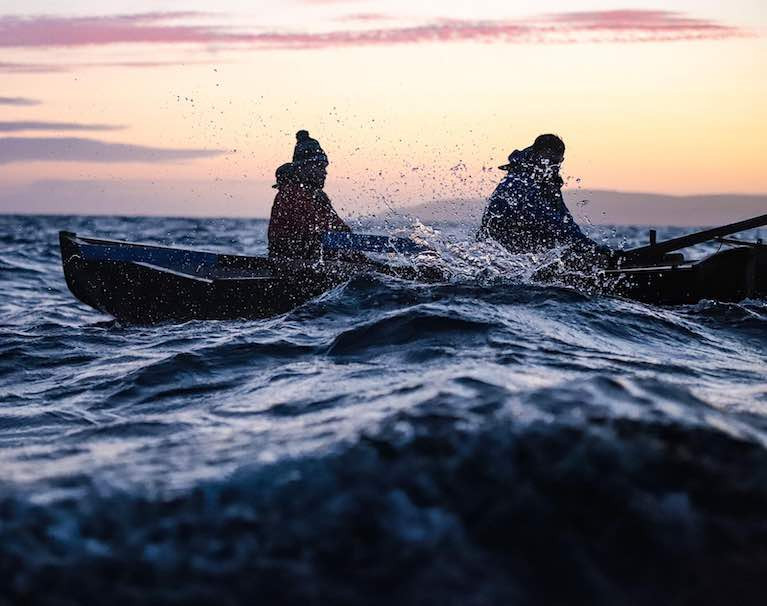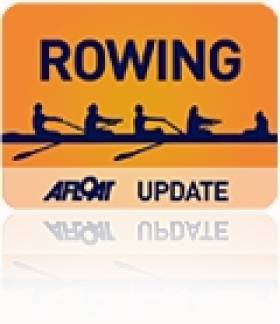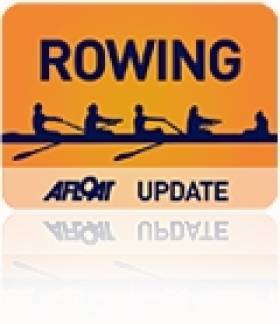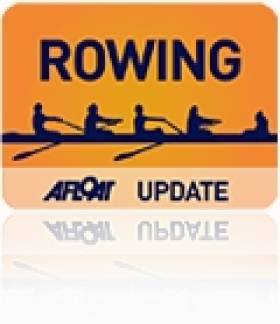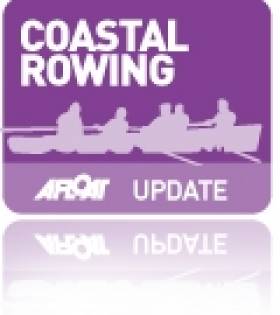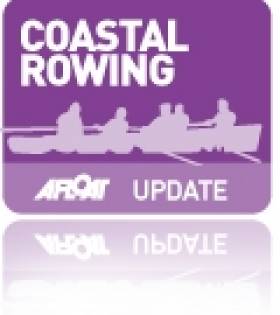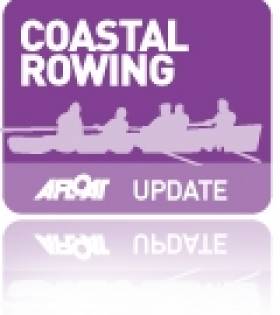Displaying items by tag: ocean rowing
Crossing the Atlantic, Losing a Friendship - Man Versus Ocean Documentary on RTÉ Tonight
“Can you see what I see?”
“ Land, land motherfxxxxxs…”
“Ireland !!! I see you! Finally, the old sod is in site...”
The words of transatlantic oarsman Damian Browne on day 108 of his extraordinary effort to row from New York to Galway last year which is the subject of a documentary on RTÉ television tonight (Wednesday December 6th)
Browne and fellow former Connacht rugby player Fergus “Gussy” Farrell from Galway had hoped to break a record of 55 days and 13 hours for the crossing.
 Damian Browne and fellow former Connacht rugby player Fergus “Gussy” Farrell setting out on their transatlantic row
Damian Browne and fellow former Connacht rugby player Fergus “Gussy” Farrell setting out on their transatlantic row
However, a series of unfortunate events, including weather and five capsizes, led to Browne spending 100 of the 112 days the row took on his own.
 Ireland here we come - Damian Browne and Fergus Farrell setting out from New York
Ireland here we come - Damian Browne and Fergus Farrell setting out from New York
Farrell, who had learned to walk again after he sustained a traumatic spinal injury, had to be evacuated after 12 days at sea. Tension was already building between the pair, who knew each other from childhood, and the documentary reflects the strain put on that friendship
Browne, who filmed himself in tears after Farrell was taken on board a ship, admitted he cursed Farrell “many’s the time” after he left and had “bags of resentment” but also knew “the guy had to get off..”
“We just knew that being on top of each other when all of the stress and anxiety was going on about our departure that something could and might possibly erupt and, ultimately, it did, ”Farrell says in the documentary made by Tomek Ciezki of Heavy Man Films.
“Thankfully, myself and Damo are well used to that between each other, so we’re well able to take it on the chin, just get over it and move on...”
 Damian Browne arrives back in Galway and is greeted by crowds of well-wishers in Galway Docks
Damian Browne arrives back in Galway and is greeted by crowds of well-wishers in Galway Docks
“I left New York with virtually no time on the water in a boat with my rowing partner. So, I was not afforded the opportunity of five or six days in a cabin to understand what life was like living on an ocean. On day two, the ocean was quite harsh and choppy, so we had to get into the cabin together. That was when things really started going...wow this is going to be difficult... It was like going into a sauna. I did not enjoy that experience one little bit,” Farrell says.
“The minute you get comfortable, the Atlantic just knocks you over,” Browne says of his ordeal when he was forced to eat cold food after losing his jet boil, along with two oars and a compass after three of his five capsizes.
He explains how he hadn’t closed the air vent on the cabin properly which let in water during the capsizes.
Man vs Ocean will air on Wednesday 6th December, 9.35 pm on RTÉ One and RTÉ Player.
Transatlantic Rower to Give Ocean Rowing Talk in Dun Laoghaire
Robert Collins, a coastal rower with St. Michael's Rowing Club in Dun Laoghaire will give a talk about his row across the Atlantic earlier this year.
As Afloat reported previously, after 55 days at sea, the St Michael’s Rowing Club duo of Collins and Kevin O’Farrell completed their epic journey across the Atlantic earlier in June.
Setting off from southern Portugal in early April in a small craft as part of a four-man crew, alongside Dutch rowers Ralph Tujin and Simon van de Hoek, the Irish pair battled rough seas, technical hitches and physical injuries to arrive in French Guiana 55 days later.
 Kevin O’Farrell (right) and Rob Collins on their way to French Guiana an epic 55-day ocean row from Portugal
Kevin O’Farrell (right) and Rob Collins on their way to French Guiana an epic 55-day ocean row from Portugal
Collins will give his talk at the National Maritime Museum of Ireland on the 23rd of November. More on this link here
Woodvale Ocean Rowing Boat For Sale Due to Injury
A Woodvale Ocean Rowing boat that crossed the Atlantic twice with previous owners is for sale in Greystones in County Wicklow.
The current owner has put the boat up for sale at €15k following an injury.
The boat was prepped and ready for an expedition from Ireland to Iceland before the injury, according to seller James Murray.
As regular Afloat readers will recall, Murray's plan was to depart Dublin and follow a 3,000km route up Ireland's east coast before crossing to Scotland.
This week, in an advert on Afloat's boats for sale section, with mixed emotions, Murray relays his Iceland odyssey thoughts:
"May never have got there, may never know, but chapters come and go. Looking for the next person to pursue their own ocean rowing dream with ‘Inspire’ which is water ready".
The Boat is of plywood construction, in good condition and, according to Murrray, was professionally surveyed last summer as well as a number of upgrade works done including; insulation, brand new solar panel (unused) and newly built Croker oars (unused) as a reserve to the two existing pairs of oars.
The full list of items included is on his advert here
Atlantic Rowers Set Sights on Guinness World Record - Podcast
Former professional rugby player and Galway adventurer Damian Browne and his lifelong friend and fellow rugby player Fergus Farrell are attempting to set a new Guinness world record in an unsupported row across the Atlantic in two years’ time.
It won’t be a currach, but it will be in a craft which they have to steer themselves. Browne has done this before, having rowed solo across the Atlantic and has also climbed five of the world’s seven highest summits. Farrell has had his own tough taste of endurance, having learned to walk again - and then walking across the country - after a serious workplace accident two years ago.
As regular Afloat readers will recall, the two men rowed a currach from the Aran island of Inis Oírr to Galway city in September to highlight their bid to cross the Atlantic in 2022.
Lorna Siggins spoke to them both for Wavelengths, the podcast of news and views from the Irish coast for Afloat below.
Battleborn Reaches Shore In Hawaii in Great Pacific Race
#ROWING: Battleborn, skippered by Irishman Philip Cavanagh, has landed in Hawaii, completing the Great Pacific Race from Monterey in California in 45 days, seven hours and 24 minutes. The crew of Cavanagh, Britons Barry Hayes and Darren Taylor and Australian Dan Kierath were the second home in the race. Their boat, Patience, flew the Irish flag. They arrived in the early hours of the morning, Irish time. Among those waiting on shore were Philip’s parents, Carmel and Michael Cavanagh.
Irish Boat Disputes Lead in Pacific Rowing Race
#OCEAN ROWING: Battleborn, the crew skippered by Irishman Philip Cavanagh and carrying the Irish flag, has been disputing the lead in the Great Pacific rowing race. The crew lay second this morning to Uniting Nations in the race from Monterey in California to Hawaii which is in its seventh day. Battleborn has covered more miles than Uniting Nations but has been heading south of the direct line. According to the organziers Battleborn reported that they may look like they’re going off course “but there will be a strategy … avoiding the rough stuff and catching the handy trade winds.”
Cavanagh’s crew is completed by a Welshman, Barry Hayes, an Englishman, Darren Taylor, and an Australian, Dan Kierath.
Kelly And Sara G Crew Rescued After Capsize
#ROWING – The crew of the Sara G, including Irishman Aodhan Kelly, have been picked up at sea after a capsize. The shore-based team said the six-man crew were safe and well on board the cargo ship Nord Taipei. The crew had been attempting to break the world record for rowing the Atlantic Ocean.
Irishman to Row Indian Ocean Naked
The Daily Edge reports on an Irishman who has announced plans to be the youngest man to row across the Indian Ocean - naked.
Keith Whelan, 30, intends to row the 6,000km route from Australia to Mauritius completely naked in an effort to raise money for anti-Aids charity Keep A Child Alive.
The event management consultant is taking the task completely seriously, having already trained for 18 months in preparation for the arduous task.
Whelan will be rowing in a 23-foot boat fitted with a radio, GPS, a satellite phone and computer equipment that will let him blog and tweet from the middle of the ocean.
If he completes the journey, Whelan would be the first Irishman to complete the Indian Ocean route solo - let alone in the nude.
The Daily Edge has more on the story HERE.
Irishmen Break Ocean Speed Record (and Podcast!)
The Sara G, with Irishmen Rob Byrne and Adam Burke making up a third of the crew, set a new world record today by becoming the fastest boat in the history of ocean rowing.
They rowed the long route across the Atlantic from Morocco to Barbados in 33 days 21 hours and 46 minutes, setting the fastest average speed for the crossing. Less than a day before, Hallin Marine had set a record for rowing the Atlantic east-west of 31 days 23 hours and 31 minutes, but they had crossed from the Canaries to Barbados, a shorter journey.
The Ocean Rowing Society, which is the record keeper for ocean rowing, is set to grant the Sara G the Ocean Rowing Blue Riband trophy for their row.
The crew was Matt Craughwell and Dr Graham Carlin from England, Byrne and Burke from Ireland, Thomas Cremona of Malta and Fiann Paul from
Iceland.
Listen in to a podcast from Barbados with Rob Byrne and Irish Times Rowing Correspondent Liam Gorman.
Rowers Pass Halfway Point in Atlantic Record Attempt
The Sara G and her crew are less than 1,000 miles from Barbados in their attempt to break the world record for the fastest Alantic crossing by an ocean rowing boat.
As previously reported by Afloat.ie, the six-man crew - featuring Irishmen Adam Langton Burke and Rob Byrne - set out from Morocco on 5 January.
And there is already some cause for celebration, as perfect conditions along the route so far have helped the team break another record - that of 10 consecutive days of more than 100 rowed each day.
Click HERE to track the crew's live progress across the Altantic.


























